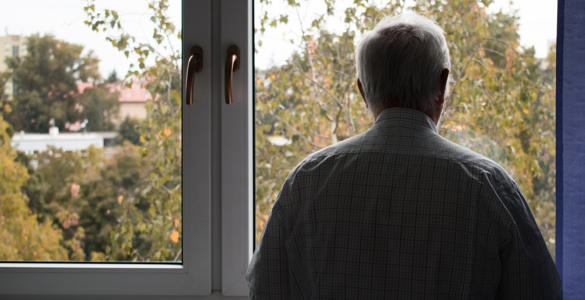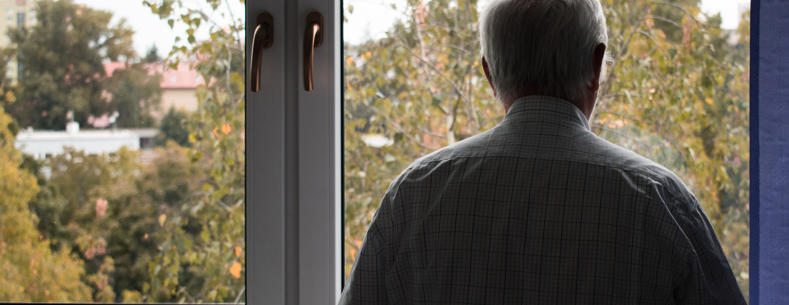There has rightly been a lot of focus on health and the NHS during this second wave of the pandemic and as we approach the difficult winter months ahead. But what are the big issues in social care? This is the first in a series of articles which looks at some of the key concerns currently being raised by the sector.
Today we look at the restrictions on care home visits. Tomorrow’s article reflects on testing in care homes and domiciliary settings and Thursday’s article focuses on unpaid carers.
Care home visits
One of the biggest worries in terms of social care has been the significant harm caused to care home residents and their loved ones who have been separated from each other for prolonged periods of time due to lockdowns and restrictions.
Whilst these restrictions were put in place in attempts to protect residents from coronavirus, stakeholders like the Older People’s Commissioner and Alzheimer’s Society Cymru are very concerned that such prolonged lack of contact with friends and relatives is resulting in a serious decline in the health and well-being of many people living with dementia in care homes.
According to the Commissioner, there is evidence that shows the progress of dementia is slowed down when residents have this kind of contact, while a lack of connection can speed up the progression of dementia. Families have also spoken out about the pain of being separated from loved ones with dementia, and then later seeing how they’ve deteriorated to the point that the resident can no longer recognise them.
The Alzheimer’s Society says that people with dementia are the ‘hardest hit’ by the pandemic, pointing to the fact that dementia is the single most common pre-existing condition in deaths involving coronavirus. Excess non-coronavirus deaths has also seen the largest increase in people with dementia. The Welsh Government has recognised this, and said further research will be needed to fully explore the reasons for this increase.
The timeline of restrictions
Many care homes took the decision to stop visitors entering the home in late February/early March to try to protect residents. The Welsh Government advised restricting visits from 23 March, but most did so earlier. Limited socially distanced visits have been permitted at certain points during the year.
In mid-June/July, some care homes began allowing outdoor visits to take place with restrictions, and at the end of August the Welsh Government's guidance for care homes was updated to allow for socially distanced indoor visits. However the guidance also said that if rates of coronavirus transmission rose in the community or at a national level, then visits may end.
This was the case in September when local lockdowns took place in some areas of Wales, followed by the national firebreak. Care home visits stopped again during these periods of restrictions, only to be allowed to restart when the firebreak lifted on 9 November. The Welsh Government updated its care home visiting guidance on 10 November. However it says:
Visits to care homes may cease if local rates of transmission in the community exceed 5%. Visits to care homes may cease if rates of COVID-19 transmission rise at a national level. Restrictions on visits to care homes may be placed on homes within a certain area of the local authority, the entire local authority area or nationally depending on the rate of transmission.
Looking ahead its possible we could see widespread restrictions again on visits. The Older People’s Commissioner wants to see action to prevent such ‘blanket bans’ saying:
With a period of further uncertainty ahead of us, it is important to understand just how difficult lockdown and prolonged separation has been for many older people and their families, and the impact this has already had on the health and well-being of many care home residents. Alongside this, recognising the additional risks to people’s health and well-being that will be created should visits be stopped again will be crucial as difficult decisions are taken in the weeks and months ahead.
Alzheimer’s Society Cymru wants family carers to be given key worker status and the regular testing and PPE they need to allow safe, meaningful care home visits.
It’s not just older people who are suffering in this situation; people with disabilities living in care homes and supported living have also seen visits restricted. The All Wales Forum (AWF) of parents and carers of people with learning disabilities says this has significantly affected people’s physical, mental health and wellbeing, and has been particularly difficult for many families with loved ones with a learning disability living in supported living accommodation. The Welsh Government says it recognises this, and issued new guidance on supported living on 6 November. Since then, people in supported living can form an extended household with others such as parents, siblings or partners, enabling unrestricted contact.
Recent developments
The Welsh Government has just announced(23 November) that temporary ‘pods’ are being provided to care homes to better facilitate visits over the winter. The £3million pilot will cover the procurement, installation and lease of 100 units, with an initial 30 being installed and ready to use before Christmas. This also includes £1million for plans to support providers who prefer to make their own arrangements on a similar basis. The Welsh Government says:
Expanding capacity within care homes will help to better support risk-assessed visiting during the winter months as some care providers have found it difficult to support socially distanced visits due to a lack of internal visiting space.
Recently the Welsh Government says its working with partners across the UK on the development of new testing technologies, and hopes to have positive news soon about new rapid tests which could be available to care home visitors. The UK Government has launched a pilot for family members to get regular, rapid testing for safer care home visits which allow physical contact. The Welsh Government has now announced (23 November) that a pilot programme will also be operating across a small number of care homes in Wales from 30 November. This is intended to be a logistical pilot to pave the way for a wider roll-out of rapid tests for visitors to more Welsh care homes, from 14 December. Given the significant concerns about the harmful impact of restrictions to care homes visits on residents and loved ones, many will be anxiously awaiting the outcomes of these new developments.
Article by Amy Clifton, Senedd Research, Welsh Parliament






